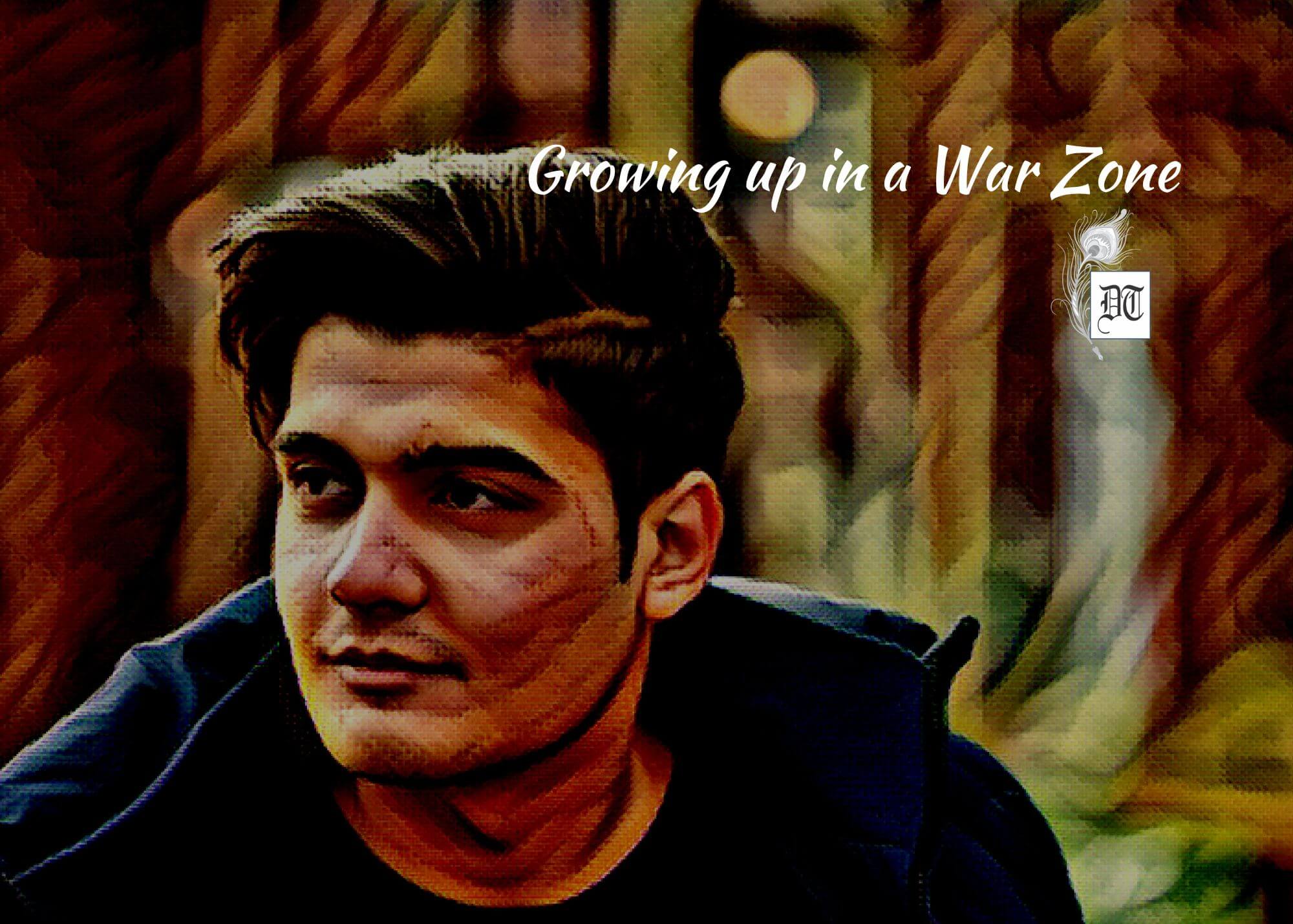Here’s a story about Madhumalati’s marriage with musically illiterate Satish Mohan, who called her ‘Raaga Jhanjhavati’, given her temper and fuss. Through various twists and turns, they land in their daughter’s residence in Bangalore, as Satish was suffering from cancer. How did their moving in affect the marital life of their daughter? What happens to the Tanpura, called Radhakanta? Find out in this engrossing fiction, by Tapan, in the weekly column, exclusively in Different Truths.
Madhumalati, as a new wife, used to find her husband’s small, rented home in Burdwan Compound, Ranchi, quite in contrast to her nouveau riche household at Jodhpur Park in Kolkata, in both its means and arrangements. She had raised quite a few storms during their tea-times over these. A busy surveyor-cum-valuer and a Prabasi Bengali since birth, her musically illiterate husband, Satish Mohan called her ‘Raaga Jhanjhavati’, given her temper and fuss.
To him, the name sounded similar to the Hindi word jhanjhat, trouble and carried in it Jhanjha, a storm. It didn’t matter to Satish that the name with which he so indulged his petite wife nine years younger to him, was not even a real Raaga. He just liked the way Madhu, hearing the sobriquet, frowned her lips and pounced on him with her tiny fists, beating his broad chest or stout shoulders.
Before Satish passed way at 81, about three years back, emoticons were much in vogue. A keen learner of practical things, Satish had noted these one afternoon on his daughter’s computer screen. “See the ‘angry’ one,Puchki, your mother should claim patent rights over that!” Madhu would re-enact the frown from their lively, frugal past, and pounced on him, with care. She couldn’t deny a terminally ill man the entertainment he loved the most.
“I don’t enjoy a siesta! Get me some books, and LP records. Gangubai, Ali Akbar, Bade Ghulam… something must be available at this God forsaken place!” Married through an arrangement between two childhood friends and cousins, Satish and Madhu had a bridge to cross. They did that, one step at a time.
So, when Satish would take a trip to a far-flung colliery, Madhu packed his tiffin with the experiments of an exploring housewife. She had lost her father the previous year. Satish filled the professor’s share, and more, with his constant pampering. Every new dish got her a gift, mostly flowers for her hair. Some days, it could be hot Imarti from the Punjab Sweets on the Main Road.
What she received one afternoon, about a fortnight after the arrival of Puchki, aka, Sucharita was discovered by an overjoyed Satish, and even Madhu was not ready for that. The calling bell rang. She was reading the annual Desh magazine, the festival edition, a prized possession for a Bengali in a sleepy, Bihari town of the Sixties. She opened the door to find a tricycle van standing in front.
“Satish Babu’s house?” the van puller was perhaps not expecting a lady. On affirmation and satisfied with the relationship of the woman with the addressee, he pointed to the rectangular box, “Tanpura hai, where to keep?”
It was from Miraj, a Khaandani piece with the Urdu signature of the maker prominently displayed on the box. After dinner that evening, savouring Simai ka Kheer under the attentions of a beaming wife, Satish said, “You were so fondly looking at your tanpura on the eve of leaving your Jodhpur Park home, that I was convinced that much of your tears that morning were meant for it.” Madhu slapped his back playfully. That night, though Satish kept advising Madhu against it, she made love to him, volunteering for the first time since her marriage.
Satish found her an ageing Khan Saab close by, at Kanta Toli. ‘Salauddin Khan Benares-waale’, the name-plate prided itself of the Gharana of its owner. Till her sixth month of pregnancy, Satish accompanied her there every Sunday on a rickshaw. When her mother came to live with them during her seventh month, she put her foot down. Her Riwaaz stopped for a couple of months for childbirth, and as soon as her health permitted, she resumed her practice with the tanpura.
Satish’s treatment for cancer of the pancreas took them to Sucharita’s residence in Bangalore. Through their 41 years in Ranchi – through rains and sunshine, through their tiny, Burdwan Compound home and the Ratu Road bungalow, through the death of Khan Saab at a ripe, old age of 97 and the birth of the son Sucharita lost later to her husband in the custody battle – Madhu and her tanpura would always find each other, once, or sometimes, twice in a day.
“You might as well have married the fellow,” Satish would chuckle, “He gets more hugs than I do.” Madhu would shush the irresponsible father, “Puchki is growing up na, have you lost your mind? Ki bhasha!”
Satish didn’t know she had a pet name for the instrument, Radhakanta, a friend of Radha. For three and a half years after the birth of Sucharita, Madhu had to steal time for being with it. When her daughter joined a playschool, eleven to twelve became her guiltless practice time.
Neighbours felt odd at first with her choice of such an unusual time for Riwaaz. Her first public concert was during Bijoya Sammilani, a post-Durgapuja gathering among the Bengalis. She sang half a dozen Hindi film songs based on classical Indian music. After that, at about eleven a.m, when Madhu did an alaap of Bhairavi or vistaarof Deshkar, tugging at the strings of Radhakanta, the same neighbours would open the windows and slide open the curtains.
Three months into the diagnosis, it was evident that for the treatment and care of Satish, they needed to shift base and live with Sucharita in Bangalore. Sucharita had done her engineering and had shifted during the early tides of Information Technology in the city. She was well placed and had obtained an equally set husband over the years.
Together, they were raising a boy of five when the Bhattacharjee couple arrived to stay with them. The first few weeks were jovial. The kid told them about everything that happened in his school, and the grandparents had a lot of stories to tell about themselves. Separated over the years, their facts merged seamlessly with fiction to entertain the child.
Radhakanta had reached Bangalore intact, despite covering a couple of thousands of miles, much to the chagrin of Sucharita’s husband, Nitin. The arrival of Madhu and Satish was a big bother to him, as he mostly worked from home. He had a setup for his work in the guest room, all to himself. That had to be given up for the elderly couple and a stupid tanpura!
In their apartment, Nitin made up for Suchi’s complete lack of training and discipline as a homemaker. She had grown up a laadli, focussing solely on education like an authentic small town, middle-class girl, with the dreams keeping her sleep hostage for years together. This change in arrangements needed him too much to adjust. He resumed office for work and, often, stayed back at a company provided service apartment near the workplace. He hated travelling or taking responsibilities which were not ordained to be his.
This was the first responsibility Suchi had to take of anyone other than her child’s. Satish had no shortage of funds, and his daughter would inherit all he had. He had, however, kept Madhu as nominee for every investment. “We have given Puchki the best education. What more could we give?” He would reason, “Any case, finally, all will be hers.” Nitin didn’t quite buy this logic. Suchi was indifferent and got embarrassed with such talks.
The mounting tension in her daughter’s household and the incremental hopes the clever medical system hooked her on, tugged Madhu from the two sides. She wanted to leave Bangalore and relieve her daughter of the stress but couldn’t. A raindrop of hope of Satish’s cure was visible on her window pane.
“You’re selfish,” Satish told her one day in between the throes of pain, “Don’t mess Puchki’s life for a dying man’s sake.”
“You’re the omniscient! Dying man!” She chided him and slapped mildly at his shoulder.
“Dr. Shastri told na yesterday that platelets are improving? I am calling Hanumanji for nothing?” She turned her face to hide tears, lest she had to bear with his pathetic Rajesh Khanna mimicry again, “Pushpa, I hate tears!”
Radhakanta was her only solace in those times. On weekdays, when no one was home, she would sing Shuddh Malkosh or a few old Bengali Tappa-s to Satish. “Dhus, Buroder gaan! I may be dying, but I am not that old.” Satish would quip but still smilingly indulged her in going ahead. Madhu could never convert the tone deaf Satish to a music connoisseur. She never needed to. Their commitments to each other were sans the contemporary challenges of sharing and appreciating. They overlapped, with no claims on each other’s space, to offer an excellent picture together as the sky and the sea would do during a sunset.
The marriage of Suchi and Nitin was on a delicate string even before the arrival of the old couple. It was tense enough to play the chores of mundane domesticity but not tuned to play the music of togetherness. Nitin found his displaced status an easy tool to seek a divorce from Suchi. With the passing of Satish, two marriages dissolved.
Nitin had a prosperous parentage, fed on the constant inflow from the coffee estates his family from Coorg owned. Suchi was never an efficient mother and didn’t have the resources or tenacity to fight Nitin’s lawyer, a renowned specialist for separation in the city. She gave up on the child ‘for his better future’.
“We will raise him like our own son, don’t worry.” Her kind mother-in-law whispered to her while the kid’s stuff was being packed in their SUV. “I know how you raised your son. Please raise him differently.” Suchi couldn’t help to say that.
Suchi got to have the kid on alternate weeks. Other than her day job, she was quite active in storytelling sessions during a few weekends and would often leave the boy with Madhu. “You can’t make Tipu sit for five minutes. How do you make twenty children sit for an hour?” Madhu wondered, and looked forward to trying her much-ignored recipes on her grandson.
“With all such pampering from both the sides, all Tipu will do is to sit only, once he is his father’s age.” Suchi’s snigger for Nitin had more than what met anyone’s eyes. Madhu knew that they slept in different rooms after the birth of Tipu. That explained a few things, but Madhu never wanted to know more about it. Tipu was a rolly-polly, just like his mother, a far cry from the warrior gene of his father.
On the days, Dadubhai Tipu was there, Radhakanta was not needed. Gradually, the days without Riyaaz increased. “Ke aar amai shunchhe? No point keeping voice fit if there is no audience.” Madhu would shrug Suchi off when she reminded Ma about her lack of practice.
Dust settled on the frame of the tanpura. Madhu used to keep it clean until a few months after Satish’s demise. Then, she left it on the housemaid. Though Radhakanta was covered in a cloth jacket, the effect of its disregard by its companion of decades got pronounced over the months.
Madhu wanted to go back to Ranchi or Kolkata, but Suchi vigorously kept rejecting any such plan. She was getting used to the cosy convenience of returning home to warm food and late night oil massages to her scalp. So, Madhu remained there, a caretaker of sorts, with a full house at her disposal.
One cloudy Wednesday, Madhu was alone. Television serials with their infinite plots and scandals, much to her dismay, had become a staple of her days. That evening, the plotting uncle or the instigating step mother-in-law couldn’t hold her to the sofa. She picked up Radhakanta.
“I’d be late. Don’t wait for dinner.” There were traffic noises in the background and a man calling Suchi. She was probably seeing someone. Madhu could guess it through Suchi’s changed hairstyle and a new wardrobe. The two ladies of the house had become more like flatmates. They enjoyed their time together, yet ensured not to transgress into each other’s space.
The tanpura needed a thorough dusting. It was out of tune, courtesy the ever changing weather of Bangalore. Many times, Satish and Suchi had suggested that she got herself an electronic tanpura. She got tempted at times herself. One look at Radhakanta always settled her doubts.
She tried a few bandish-es of Malhar. Khan Sa’ab had his favourite ‘Aayi Samdhan mori re….” She picked on that. During ascension of the tune, aaroh, she was uncomfortable. Bangalore weather had resurfaced her old respiratory issues. The past few days had been wet. She could hear her breathing sound like that of wind blowing through a tiny gap in between the door shutters. The elevators in the apartment and her slow speed of walking didn’t aggravate matters. Suchi had been coming late for the last few days. Madhu preferred to let her know of her troubles or the household needs only on weekends and had kept her bronchial inconvenience to herself.
“Sandal Gulab chis lagayi….” Her spirit wished to soar to the familiar heights. Her voice chained it down. A rage took Madhu over. She raised the voice over her frailty. “Ektu jal khao. Take some water, rest your voice, sur ki paaliye jachhe?” She didn’t have Satish to pull her back within the limits of sanity. She soared, failed and stretched again.
Her blood vessels reminded her of her hypertension. She drowned them in the murki-s of komal dhaivat. Her brain flashed the news that she had not taken the routine Stamlo-5 for pressure control that morning, and before that, and…
Between the thorax and the feeding arteries, something snapped. Darkness, deeper than the somber evening outside the windows, began to descend upon her. Through her dimming vision, she saw Radhakanta blending into a photograph of Satish on the wall. Her mobile was at about seven feet from her right hand. It had an emergency dial key; Suchi had trained her well for such contingencies. Madhu stretched her right hand, in vain, holding her tanpura tight in her left.
Radhakanta, or Satish, she couldn’t tell who reached towards the mobile, picked it up and pressed the gadget into her palms. Her instincts, despite her failing faculties of sight and sound, could go through the rigmarole of calling 108.
Later, finally, at about 9:30, Suchi could meet and speak to the Crisis Management Team (CMT) of Manipal. They were alerted by the Emergency call and had to break into her apartment. Internal haemorrhage was diagnosed as the reason for her black-out through the nerves close to the motor control area of the brain.
Suchi’s number was next to 108. They had called her once Madhu was handed over to the Intensive Care Unit (ICU). After not picking up an unknown number for seven times, and not wishing to spoil her date, Suchi could finally be contacted.
“A half an hour delay in our arrival could have been catastrophic.” Madhu would live for sure, vitals were getting stable, but the stresses of Indian classical music would, perhaps, be prohibited forever. “The phone was lying quite far from Madam, we are not able to make out how she dialled from that!” They were flummoxed.
A tanpura had crashed on the phone, they informed and was shattered to the last of its gourd pieces. The screen of the mobile was damaged as well, but the Emergency call function had somehow worked.
“Who can kill someone if God wants to save?” a twenty-five-ish smart-ass in the team quipped.
Visual from Different Truths






 By
By
 By
By